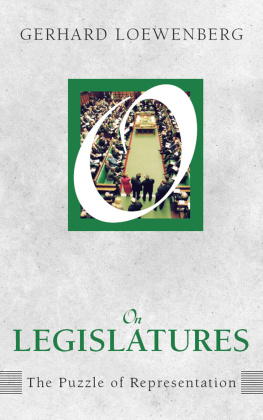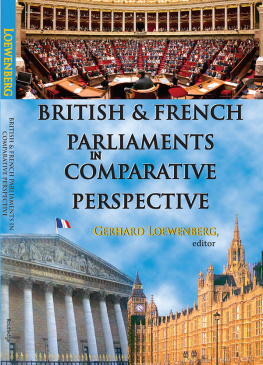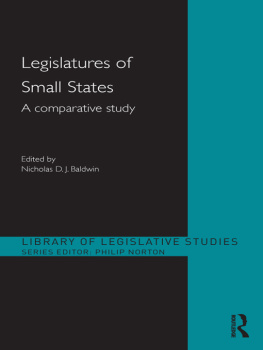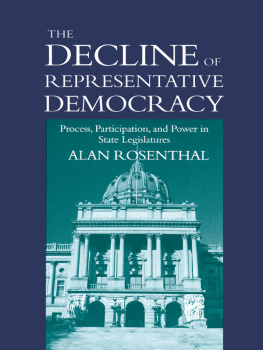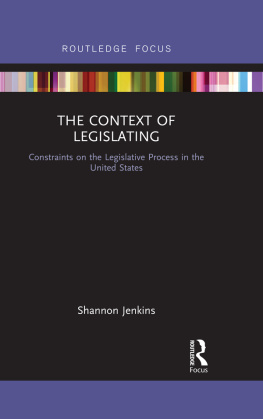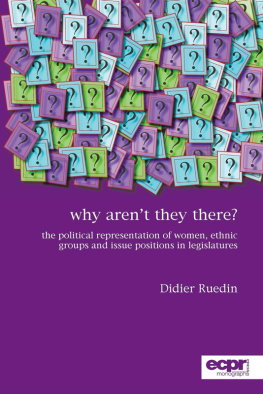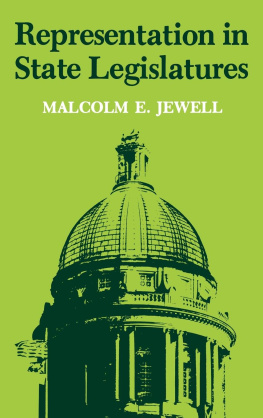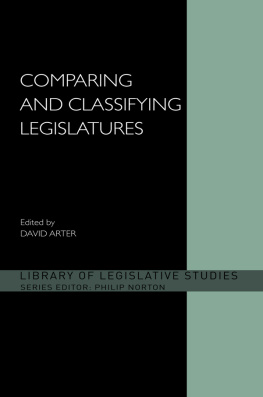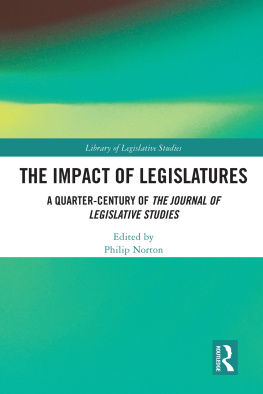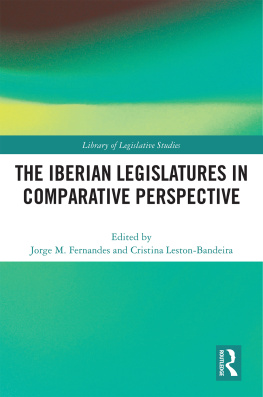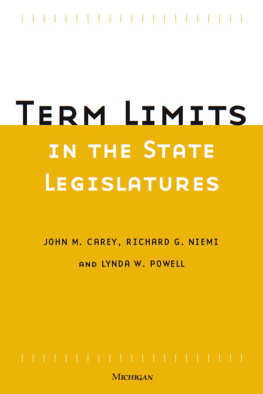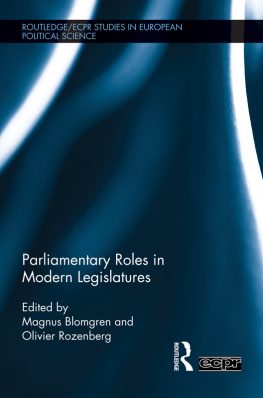ON LEGISLATURES
ON POLITICS
L. Sandy Maisel, Series Editor
On Politics is a series of short reflections by major scholars on key subfields within political science. Books in the series are personal and practical as well as informed by years of scholarship and deliberation. General readers who want a considered overview of a field as well as students who need a launching platform for new research will find these books a good place to start. Designed for personal libraries as well as student backpacks, these smart books are small format, easy reading, aesthetically pleasing, and affordable.
Series editor L. Sandy Maisel is the William R. Kenan Jr. Professor of Government and is Director of the Goldfarb Center for Public Affairs and Civic Engagement at Colby College. He is also the director of the Colby in Washington Program.
Books in the Series
On the Presidency, Thomas E. Cronin
On Appreciating Congress, Louis Fisher
On Foreign Policy, Alexander L. George
On Thinking Institutionally, Hugh Heclo
On Legislatures, Gerhard Loewenberg
On Ordinary Heroes and American Democracy, Gerald M. Pomper
Forthcoming in the Series
On Media and Making Sense of Politics, Doris A. Graber
GERHARD LOEWENBERG
ON LEGISLATURES
The Puzzle of Representation
First published 2011 by Paradigm Publishers
Published 2016 by Routledge
2 Park Square, Milton Park, Abingdon, Oxon OX14 4RN
711 Third Avenue, New York, NY 10017, USA
Routledge is an imprint of the Taylor & Francis Group, an informa business
Copyright 2011 , Taylor & Francis.
All rights reserved. No part of this book may be reprinted or reproduced or utilised in any form or by any electronic, mechanical, or other means, now known or hereafter invented, including photocopying and recording, or in any information storage or retrieval system, without permission in writing from the publishers.
Notice:
Product or corporate names may be trademarks or registered trademarks, and are used only for identification and explanation without intent to infringe.
Library of Congress Cataloging-in-Publication Data
Loewenberg, Gerhard.
On legislatures : the puzzle of representation / Gerhard Loewenberg.
p. cm. (On politics)
Includes bibliographical references and index.
ISBN 978-1-59451-751-8 (hardcover : alk paper)
ISBN 978-1-59451-752-5 (paperback : alk paper)
1. Representative government and representation. 2. Legislative bodies.
I. Title.
JF511.L598 2010
328.3dc22
2010020952
Designed and Typeset by Cheryl Hoffman.
ISBN 13: 978-1-59451-751-8 (hbk)
ISBN 13: 978-1-59451-752-5 (pbk)
CONTENTS
I have been thinking and writing about legislatures throughout my entire professional career. I therefore welcomed the invitation from Jennifer Knerr of Paradigm Publishers and L. Sandy Maisel of Colby College to write a book about legislatures for their innovative series On Politics.
Despite the large literature on legislatures, there are surprisingly few general books on this important political institution. This book is intended for students of legislatures in undergraduate courses and as an introduction for graduate students interested in the subject. I hope it will also appeal to those members of the public who care about democratic politics but are baffled from time to time by the peculiarities of this venerable institution.
Legislatures seem to have the characteristics of other things we love: we cant live with them but we cant live without them. I aim to explain what makes legislatures so puzzling and to sketch in broad outline what has been learned about them as a result of the large volume of research since the middle of the last century.
I am indebted to many colleagues who have over the years continued my education in the field of legislative research. In writing this book, I have particularly valued the advice of Peverill Squire, who read the entire manuscript, made many valuable suggestions, and saved me from making numerous errors. The , Ways of Studying Legislatures, for which I am very grateful.
For over half of my professional life, I have worked with Michelle L. Wiegand in editing the Legislative Studies Quarterly. I could not possibly have had a more loyal, more supportive, and at the same time more exacting colleague. Editing the journal made it possible for me to maintain my knowledge of the literature of legislative research even when other responsibilities at the University of Iowa might have distracted me.
My wife, Ina, encouraged me to write this book and read the entire manuscript. Her sense of style and the logical development of ideas greatly improved the manuscript as well as everything I have ever written.

L egislatures are puzzling institutions. How is it that a collection of several hundred members who are nominally equal to each other can ever reach a decision? How is it that an institution, which is presumably representative of the people, is usually the most unpopular institution in a system of government? These contradictions arise out of the history of the institution, out of the contrast between the characteristics it had at its origin in medieval Europeits genetic properties, so to speakand those the institution developed as it adapted to changing political environments over eight or nine centuries. It would be difficult to imagine any other organization of several hundred members that had no boss, no assignment of duties, no one in charge of hiring or firing, and no bottom line to evaluate success or failure. Legislatures attract scholarly attention, in part, because they are puzzling. Interested citizens who look at sessions of a legislature on public television usually see numbingly boring scenes of members speaking to an empty chamber, or standing around waiting for the results of a roll call, or interrupting each other with points of order. It is hard to make any sense of what is going on.
Legislatures are unlike other political institutions, most of which can be pictured on an organizational chart with defined lines of authority and responsibility. By contrast, each member of a legislature is formally equal to every other member; no member can legally order another member around, let alone hire or fire him or her. No constituency can accept control of its representative by a representative of another constituency. So legislatures are large collections of individuals who do not formally owe each other obedience and do not necessarily accept any division of labor among themselves. No wonder legislatures are difficult to understand. And no wonder they so often frustrate the public by their apparent indecisiveness. How they manage to act at all is one of the central puzzles that scholars have tried to understand.
Legislatures as Objects of Research
Legislatures multiplied in the second half of the twentieth century with the multiplication of independent countries. By the first decade of the twenty-first century, there were 191 national legislatures, as well as a very large number of legislatures at sub- and supranational levels of government. The survey is obviously a rough effort, its results providing evidence of the difficulty of assessing the role that legislatures play in governance by relying merely on expert opinions of legal texts.

